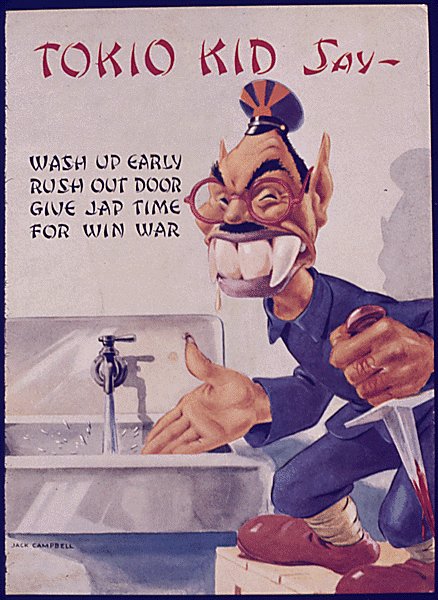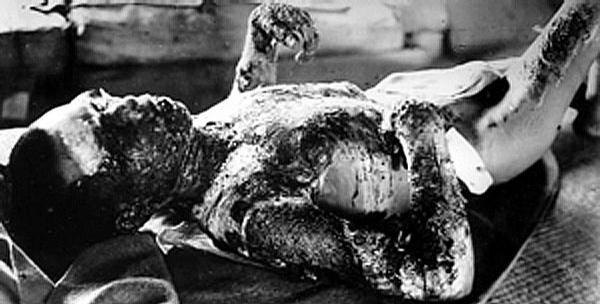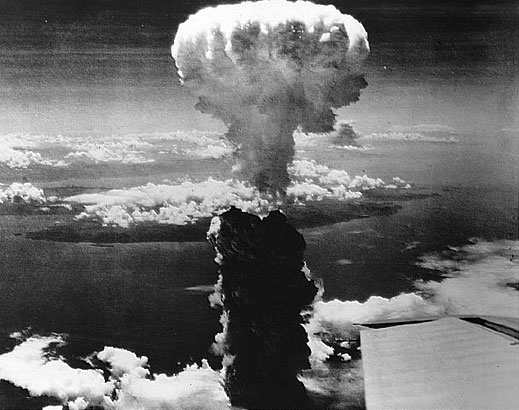6th August 2010, if we’re inclined not to forget it, was the sixty-fifth anniversary of the atom-bombing of Hiroshima.
Making absolutely no attempt to be even-handed on this point, I shall ignore, for the purposes of this article, Japanese crimes in China and elsewhere, and just point out that this bombing was not only a war crime, designed purely as a terrorising measure, but had absolutely nothing to do with its stated objective, namely, Japan’s surrender.
To recapitulate:
Japan, at that time, had no functional navy left, and not even a functional merchant navy; it had to literally take to sailing ships to smuggle a modicum of food and raw materials to the home islands. Japan’s aviation had been sacrificed in pointless kamikaze attacks, most of its army trapped fighting in China, the Philippines and South-East Asia. Japan’s cities were burned out shells; the repeated massed B29 raids had gutted the heart of virtually every major Japanese city, and reduced the Japanese people to the brink of starvation [1]. And with the Soviet Union’s declaration of war on Japan obviously imminent – Stalin had signed an agreement with Roosevelt and Churchill at Yalta in February promising to attack Japan 100 days after the end of the European war – the last remaining sources of raw materials and food, Korea and Manchuria, would soon be lost.
Japan was finished, and was all ready to sue for peace; the only condition it made was that the position of the Emperor should be protected. The Japanese government under Kantaro Suzuki that took office in April 1945 did so with the one single objective of ending the war. All this was known to the Western Allies, since the Japanese codes had long since been broken. [1]
And still Hiroshima, and three days later, Nagasaki, were A-bombed.
What did these bombs achieve, besides the deaths of approximately 220,000 civilians, in their stated objective of ending the war? Nothing, zero, doodly-squat. Japan surrendered, but on exactly the same terms the Allies could have got without the A-Bombing, meaning, that the Emperor remained on the Chrysanthemum Throne and didn’t even have to answer for his role in starting the war.
These are the terms the Japanese offered as early as 20 January 1945, and repeated through the USSR in July [1]:
* Complete surrender of all Japanese forces and arms, at home, on island possessions, and in occupied countries.
* Occupation of Japan and its possessions by Allied troops under American direction.
* Japanese relinquishment of all territory seized during the war, as well as Manchuria, Korea and Taiwan.
* Regulation of Japanese industry to halt production of any weapons and other tools of war.
* Release of all prisoners of war and internees.
* Surrender of designated war criminals.
These are the exact same terms that the Americans accepted at the official Japanese surrender in September 1945.
So, what was the point? What but a warning to the USSR to behave and keep to its ordained place in the scheme of things, not to get “too big for its boots”, as it were?
Even if one accepts the fiction that the bombing of Hiroshima was necessary to end the war without massive loss of (more valuable) American lives, it’s almost impossible to try to justify the bombing of Nagasaki. Even if one claims that Hiroshima had to be atomised to scare the Japanese into submission, something that could have been done by atom-bombing an isolated military base [1], destroying Nagasaki was pure overkill, if one believes that it was meant to force the Japanese to surrender. However, it does make sense in a completely different context: if, that is, it was meant as a warning to the USSR that the US had more than one bomb and was ready to use them.
Incidentally, Nagasaki was bombed somewhat by accident; the actual target was Kokura, but because clouds obscured the aiming point, “Bock’s Car” (the B29 involved) flew to the alternate target, Nagasaki.[8]
Also, there is another reason why the Bomb was used on Nagasaki: because spending the money to develop it demanded that it be utilised. It was a plutonium implosion device of the kind tested in Alamagordo, New Mexico, in July 1945, much more sophisticated and powerful than the gun-type uranium bomb dropped on Hiroshima, which required no testing.
At 8:16 on the morning of August 6, 1945, the world got a glimpse of its own mortality. At that moment, the city of Hiroshima was obliterated by a fireball that sent waves of searing heat, then a deafening concussion, across the landscape. Three days later, a second bomb hit Nagasaki. … [President Dwight D.] Eisenhower said in 1963 “It wasn’t necessary to hit them with that awful thing.”
… Besides the Manhattan Project’s internal momentum was an external motive. Its leaders had to justify the $2 billion ($26 billion in today’s dollars) expense to Congress and the public… Byrnes…warned Roosevelt that political scandal would follow if it [the atomic bomb] was not used. … “How would you get Congress to appropriate money for atomic energy research [after the war] if you do not show results for the money which has been spent already?” …the U.S. had produced two types of bombs–one using uranium, the other plutonium. Whenever anyone suggested that the moment the bomb was dropped the war would be over, [bureaucrat] Groves countered, “Not until we drop two bombs on Japan.” As [historian] Goldberg explains… “One bomb justified Oak Ridge, the second justified Hanford.” Hiroshima was hit with the uranium bomb, nicknamed “Little Boy”; the plutonium bomb, “Fat Man,” was used against Nagasaki.”
From Why We Dropped The Bomb By William Lanouette, CIVILIZATION, The Magazine of the Library of Congress, January/February 1995
Also,
Scientists at Los Alamos were also intrigued as to which type of bomb was the better – a uranium or plutonium based bomb. ‘Little Boy’ showed its effectiveness at Hiroshima but another bombing mission was needed to see what damage a (plutonium – this site mistakenly writes “uranium”) bomb could do. [8]
We probably should allude to the revenge factor, too; since the attack on Pearl Harbour was played up as a Day of Infamy, instead of what it really was, a desperate (and predictable) move by a Japan pushed to the wall, Hiroshima and Nagasaki were called retaliation for the attack. This was silly if one thinks of it, because “revenge” had been taken over and over and over by then on Japan’s civilians, its old men and women and children, by bombs and starvation. But this was easy because the Japanese weren’t thought to be human beings in the same way as the Germans, for instance; contemporary US propaganda always showed them as bespectacled, buck-toothed monkeys and rats.
 And it’s hardly secret that Japanese soldiers’ body parts were often taken by Americans as war trophies. [7]
And it’s hardly secret that Japanese soldiers’ body parts were often taken by Americans as war trophies. [7]
 The racist component to the anti-Japanese war shows through clearly when you remember the US interned Americans of Japanese origin (Nisei) in camps, but not Americans of German origin, a move that would have sent Dwight Eisenhower and Kurt Vonnegut, among others, behind barbed wire.
The racist component to the anti-Japanese war shows through clearly when you remember the US interned Americans of Japanese origin (Nisei) in camps, but not Americans of German origin, a move that would have sent Dwight Eisenhower and Kurt Vonnegut, among others, behind barbed wire.
In contrast to Eisenhower’s frank though belated admission in 1963 [1]…
During his [Stimson’s] recitation of the relevant facts, I had been conscious of a feeling of depression and so I voiced to him my grave misgivings, first on the basis of my belief that Japan was already defeated and that dropping the bomb was completely unnecessary, and secondly because I thought that our country should avoid shocking world opinion by the use of a weapon whose employment was, I thought, no longer mandatory as a measure to save American lives. It was my belief that Japan was, at that very moment, seeking some way to surrender with a minimum loss of “face.”
…Harry Truman, who actually ordered the bombing, had this to say [1]:
“The world will note that the first atomic bomb was dropped on Hiroshima, a military base. That was because we wished in this first attack to avoid, insofar as possible, the killing of civilians.”
As the same website points out,
This was a preposterous statement. In fact, almost all of the victims were civilians, and the United States Strategic Bombing Survey (issued in 1946) stated in its official report: “Hiroshima and Nagasaki were chosen as targets because of their concentration of activities and population.”
It’s not as though the use of nuclear weapons was supposed to be restricted to this one occasion. General Douglas MacArthur, US proconsul for Occupied Japan, later had plans to drop no less than up to fifty atom bombs over China in order to stave off defeat in North Korea. He
… explained he would drop between 30 and 50 atomic bombs- strung across the neck of Manchuria, and spread behind us, from the Sea of Japan to the Yellow Sea-a belt of radioactive cobalt-for at least 60 years there would be no land invasion of Korea from the North. The Russians, he claimed, would be intimidated by this and do nothing. He continued to seek authority to deploy the bomb. [2]
See how the killing of hundreds of thousands of Asians implicitly to warn off the Russians was followed by the planned killing of perhaps millions of Asians, and the deliberate contamination of Asian land, again, and now explicitly, in order to warn off the Russians?
There was a racist component to this as well. The American “End the War offensive” of 1950, which was meant to “get the boys home by Christmas”, was launched by the US when it knew that the Chinese had crossed the Yalu river into North Korea; yet it advanced, with the soldiers being told “Don’t let a bunch of Chinese laundrymen stop you.” (vide Enter the Dragon: China’s Undeclared War Against the US in Korea, 1950-51 by Russell Spurr). The same author mentions massacres of Korean civilians and notes that the war introduced a new pejorative term meant to dehumanise Asians: gook.
Korean farmers were literally used as target practice by US marines sighting their rifles (vide Philip Caputo, A Rumor Of War). And as late as the early sixties, British historian David Rees could feel able to get away with saying (in Korea: The Limited War)
The conquest of the civilised world by millions of expendable Asians had turned out to be a futile dream.
Obviously, then, the use of nuclear weapons against Asiatic Untermenschen was easy to contemplate, especially since they had already been used. Once you use the Ultimate Weapon, it becomes easier to use it again.
So it won’t be surprising to note that, just three years later, in 1954, when the French were facing defeat at Vietnamese hands at Dien Bien Phu, the United States’…
Secretary of State John Foster Dulles reportedly offered France nuclear weapons to use on the … [3]
…Viet Minh troops armed with carbines and a few artillery pieces. Again, Asians, being at the receiving end, were thought fair game.
Would MacArthur, or for that matter the US administration of the time, have contemplated the use of nuclear weapons in order to terminate a conflict between say Greece and Turkey, or to help France to crush an independence movement in Brittany? I somehow don’t think so!
Yes, there is quite unmistakably a racial component in the planned or threatened use of nuclear weaponry by the only nation to ever use the Bomb, and by its satraps.
And now, with an invasion (or at least bombing) of Iran apparently imminent [4], there’s talk of use of nuclear bombs by the US and/or its satrap “Israel”. If Iran could actually have threatened retaliation with nuclear weaponry, I doubt that there would have been any talk of a bombing, let alone nuking – take a look at North Korea, whose minuscule arsenal, although of questionable reliability, has kept it safe from attack. But “Israel”, being a white (pseudo-) nation in a (barbarian) Asian sea, deserves any and all latitude in “self-defence” as long as the targets are Asians.
I read [5] that Obama is contemplating a “revisit” of the decision to bomb Hiroshima, since he wants to eliminate nuclear weapons. But his extreme propensity to speak the unadulterated, unvarnished truth, and his record of utterly untainted honesty make me reluctant to trust him for the correct time.
To return to Hiroshima, where 140,000 expendable Asians were slaughtered to warn Stalin off Western Europe, here’s what a survivor had to say:
There were red burned and bloated dead bodies piled up high, the corpses with the guts and the eyes popped out, over-capacitated trains burned black and crisp, people buried alive under buildings and dead, lines of ghost-looking people with burned frizzled hair and burned skin hanging, etc… It was not a scene of human life but a miserable hell. I never forget the mortification I had not being able to give water to those crowds of barely living survivors who were not able to save their own children or parents. [6]
 Think of that next time you hear the words “mushroom cloud”.
Think of that next time you hear the words “mushroom cloud”.
Sources:
[1] http://www.ihr.org/jhr/v16/v16n3p-4_Weber.html
[2] http://b-29s-over-korea.com/Why-Truman-F….-MacArthur.html
[3] http://military.discovery.com/history/vi….bien-phu-2.html
[4] http://original.antiwar.com/giraldi/2010/08/04/a-cakewalk-against-iran/
[5] http://www.independent.co.uk/news/world/….on-2044819.html
[6] http://kasamaproject.org/2008/08/06/%E2%….urvivor-speaks/
[7] http://en.wikipedia.org/wiki/American_mutilation_of_Japanese_war_dead
[8] http://www.historylearningsite.co.uk/bombing_of_nagasaki.htm


Great post Bill… despite the fact that you claim it’s not an attempt to be “even handed” it goes some way to address the fact that this subject was hardly “even handed” from the opposite perspective.
I think it’s fairly obvious the “west” was lied to. There was a political purpose for the bombing of both these cities, but it had nothing to do with “saving lives”.
***
As an aside, it’s interesting to note that here in Australia, internment camps hosted German, Italian and Japanese nationals. Internees also included nationals of over 30 other countries, including Finland, Hungary, Portugal, Russia and even naturalised British subjects of “enemy” parentage.
For all that the Western powers have done (or conpemplated doing) with nukes against other powers, I have no doubt that – if the shoe were no the other foot – the various Asian powers mentioned in the article would have done the same thing if they were the first to acquire the bomb: it’s no secret that the Japanese mentallity of the 1940s regarded Western peoples as “inferior” and happily treated them like animals when they had the chance – not significantly different from what Western forces did to them.
As long there is a fear of the “other” new technological powers will be brought to bare against this “other” by the force that monopolizes them first – the rest is all just a matter of who acquires what, when and how that power will rationalize the use of that technology.
Dehumanizing your subjects is necessary for the purposes of perpetrating war. If you can convince yourself that the victims are somehow less human, less deserving than you, it’s far easier to deprive them the right to life or the ability to adequately fulfill their needs for food and shelter. The most irresponsible part of the advocacy of nuclear bombing is the conscious knowledge of the degree of destruction it entails. Test bombing was abolished in New Mexico and off the Adak Island of Alaska when the long lasting effects were determined to cause cancerous mutations in the genome over an alarmingly wide circumference. Ho Chi Minh once called the atom bomb a paper tiger because it’s no longer in the hands of just the United States. What one country decides to use will only increase the list of justifications for use on the other side. It’s a no win situation unless you belong to that particular class of people who desire global suicide.
Great piece, Bill. It’s about time someone said it.
I have to agree with Christopher. The race was on and the knowledge was out there, someone was going to use it. Does that make it right? Absolutely not, but since when has the human race done the right thing when they could instead ‘win’.
It is good to remember and I fear every generation away from this event grows a little less worried about nuclear weapons and their effects.
The problem I have with the “race was on” hypothesis is that at the time the Japanese had no nuclear weapon, and they went to war with the US reluctantly and only because they felt their survival as a “modern” (ie colonialist instead of colonised) nation was at stake, and that only by going to war could they secure equal treatment for themselves at the “high table” of nations. They were not in the nuclear race. The Germans were, but by 1943 it was well enough known to the Allies that the Nazis would not have a nuclear bomb before the US did. The USSR, at the time, did not even have a nuclear programme, and only after the war and the American nuclear arsenal went all out to get a bomb of their own.
Therefore if there was a race to make the bomb, it was a race of the US’ own creating, however inadvertently.
@Bill,
Even though the Japanese didn’t have a nuclear program, they still had other manner of weapons programs running (including, of all things, a sort of “death ray” designed to incapacitate/kill biological organisms via ultra-high frequency sound waves – they never got it to work, but had it nonetheless) – the fact of the matter remains that if the Japanese had successfully developed some kind of superweapon before we did they would have used it in a manner similar to the way the U.S. used the bomb.
Like you said, they were fighting to secure their status as an imperial power (ironically under the guise of “fighting colonialism” – I suppose they just meant Western colonialism…) – and there’s very little empires won’t do if it means protecting their own power base. For as recklessly as the U.S. used it’s power in the war, I have no doubt that things would not have been significantly different if they go a hold of a superweapon first…
Wow. I don’t know what’s worse, the fact that you actually wasted time of your existance writing this vitriolic nonsense, or the idea that somebody may have paid you for this idiotically offensive ‘reporting’, or the apparent fact that an unfortunate number of morons not only stated the fact that you and this article are full of crap, but instead and insanely seem to agree with it. And of course, there’s the idea that you’re rather create nonsense about a matter more than 50 years old when you could be spewing idiotic drivel about so many current matters. But, looking at the site’s title. I can’t say I’m shocked with the wastes of time printed therein…
[…] [1] http://subversify.com/2010/08/13/mushroom-cloud-over-hiroshima/ […]
@Zack
It is fine to have our own views about this issue (me for instance being a history major knows more about this and saving lives was maybe one of the issues but surely it never was the most important one as, with all our military might, we might have had at least 30,000 to 100,000 casualties [these are actual estimates by the top commanders in the defense department under Truman]) but it is not right to tell others what kind of skewed views they have just because they do not fit your own.
Bill, I am impressed by the depth of this article. It is a very good synthesis of a reason why did we launch the A-Bomb, and, while there were many reasons (you defended one) you are right in saying that we used it as a show of power, but it never was the sole reason. A book I do recommend you to read out of my US foreign relations class that relates to this is “Prompt to Utter Destruction” it might help.